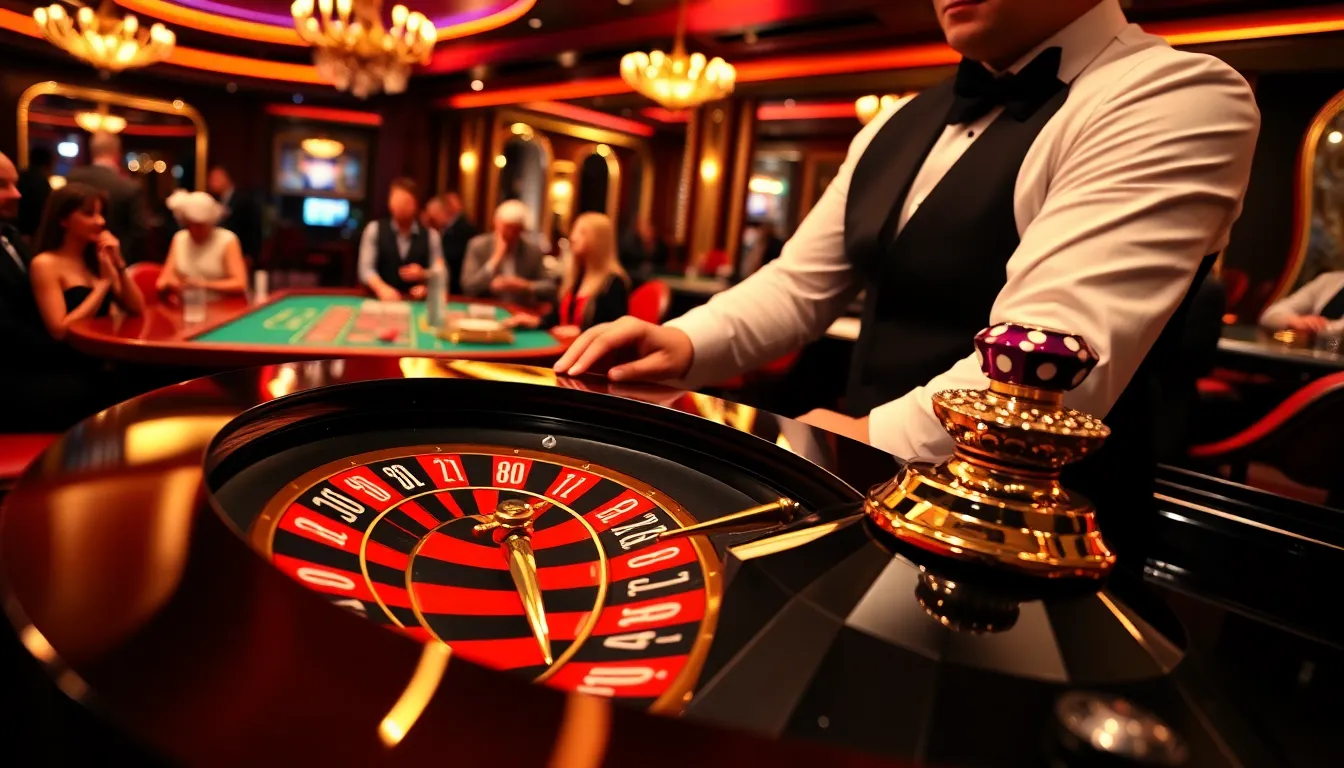Every time someone steps into a casino, the thrill of the game is palpable. But lurking behind the glitz and glamour is a little something called the house edge. It’s the casino’s not-so-secret weapon that keeps the lights on and the drinks flowing. Think of it as the casino’s way of saying, “We love having you here, but let’s not get too carried away!”
Table of Contents
ToggleUnderstanding Casino House Edge
The house edge represents a crucial aspect of casino gaming. Players encounter this built-in advantage across various games like poker, blackjack, and slot machines.
Definition of House Edge
House edge quantifies the casino’s statistical advantage over players. For example, in roulette, the house edge typically stands at 5.26%, meaning players retain only 94.74% of their wagers in the long run. Each game exhibits its unique house edge percentage, greatly influencing player outcomes. Players must understand these numbers to make informed betting decisions. Knowledge of the house edge provides insight into potential winnings and losses, solidifying its definition as a vital component of casino gameplay.
Importance in Gambling
Understanding house edge plays a key role in the gambling experience. Players can manage their bankrolls effectively by recognizing the advantage casinos hold. Informed decisions often lead to a more enjoyable experience. Congruently, awareness of house edge fosters responsible gambling. Betting strategies can be adjusted based on the house edge of various games, enhancing the likelihood of favorable outcomes. Ultimately, the house edge is not only a statistic but also a vital consideration for enhancing player enjoyment and financial management in casinos.
How House Edge Works

The house edge represents the built-in advantage casinos have over players. Understanding how this edge functions enhances players’ gaming experiences.
Calculation of House Edge
Calculating the house edge involves comparing the odds of winning with the payouts. For example, in a game where the odds of winning are 1 in 36, but the payout is only 35 to 1, the house edge becomes evident. The formula to determine the house edge is:
[
text{House Edge} = left( text{Total Bets} – text{Total Payouts} right) / text{Total Bets}
]
This formula calculates the percentage of each bet that the casino retains. Players see that this percentage reflects their long-term expected loss in relation to their wagering amounts.
Variations Across Games
The house edge varies significantly across different casino games. Blackjack typically has a house edge of around 1% when players use basic strategy, while slot machines can range from 2% to 15%. Roulette offers a house edge of 5.26% for American versions and 2.63% for European variants. Such differences arise from game rules, payout structures, and player options. Understanding these variations enables players to make strategic decisions, boosting their chances for more favorable outcomes.
Factors Influencing House Edge
Several factors influence the house edge across various casino games. Understanding these elements can lead to better gameplay and more informed betting decisions.
Game Rules
Game rules impact the house edge significantly. Each game comes with specific rules that define how bets are placed, how wins are calculated, and how payouts are structured. For example, blackjack rules may allow players to split or double down, affecting the game’s overall odds. Similarly, variations in poker rules can change player advantages. The complexity of game rules generally corresponds with the potential house edge, meaning simpler games tend to have a higher edge while skill-based games may lower it.
Player Decisions
Player decisions directly influence the house edge. Choices made during gameplay can either increase or reduce the edge. In blackjack, employing basic strategy minimizes the house edge to around 1%. On the other hand, hasty decisions can lead to a higher edge. In games like baccarat, betting on the banker has a lower house edge than betting on the player or tie. Awareness of decision-making consequences allows players to choose strategies that favor their position, maximizing their chances of winning while minimizing losses.
Strategies to Minimize House Edge
Implementing effective strategies can help players minimize the house edge while maximizing their gaming experiences. Here are key strategies players can adopt.
Choosing the Right Games
Selecting games with lower house edges significantly impacts potential payouts. Blackjack typically offers a house edge around 1% when played with basic strategy, making it a favorable option. European roulette features a reduced house edge of 2.63%, providing better odds compared to its American counterpart, which has a 5.26% edge. When exploring slot machines, players should look for those with higher payout percentages, as these often have lower house edges, ranging from 2% to 15%. Familiarizing oneself with these differences can enhance informed game choice, thus improving overall results.
Bankroll Management
Effective bankroll management plays a pivotal role in reducing losses at the casino. Establishing a budget helps players understand their spending limits and stick to them, promoting responsible gambling practices. Allocating funds for specific games limits risk exposure, enabling players to make strategic decisions without jeopardizing their finances. Setting win and loss limits ensures players know when to walk away, preserving their bankroll. Monitoring sessions can also aid in recognizing winning streaks or losses, further refining gameplay tactics. By following these principles, players can maximize enjoyment while minimizing long-term house advantages.
Conclusion
Understanding the house edge is vital for anyone looking to enjoy their casino experience responsibly. By recognizing the statistical advantage casinos hold players can make informed decisions that enhance their gameplay. Choosing games with lower house edges and employing effective bankroll management strategies can lead to a more enjoyable experience.
Ultimately it’s about balancing fun with awareness. Players who grasp the concept of the house edge can navigate the casino landscape with confidence. This knowledge not only enriches their gaming experience but also promotes responsible gambling practices, ensuring that they enjoy their time at the tables or slots while minimizing potential losses.



